Nobody likes to be sold to, but everybody likes to buy.
The online world cannot be summed up into a better sentence than above. Everyone is out there, looking to buy, but they don’t want to hear your boring ‘sales pitch.’
So, how do you grow your sales, then?
The answer lies in harnessing the ‘pull power’ of inbound marketing. Let’s look at some compelling reasons and inbound marketing trends for 2025 and beyond.
Benefits of Inbound Marketing
Inbound marketing is not something new. Brands have been practicing it in some form or other through posters and magazine ads, which made them discoverable and attracted buyers for decades.
However, inbound marketing emerged in 2005 when Brian Halligan coined this term. Since then, the process and concept have evolved into a dedicated stream of marketing that involves attracting strangers and converting them into loyal customers.
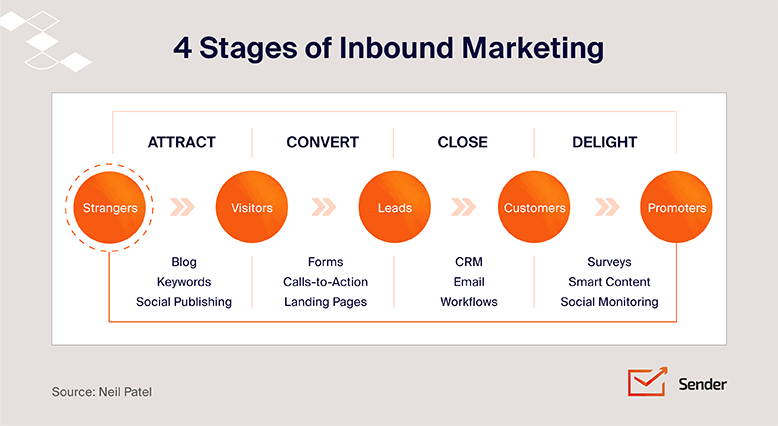
Here are the benefits of using the inbound marketing approach for your brand or business:
- Increased brand awareness: Using inbound strategies like content creation to attract potential customers increases your visibility. When you post consistently, it builds authority and splashes your brand across more screens, which makes sure people remember your name;
- Higher quality leads: Inbound marketing works on the principle of attracting folks who are actually keen on what you’ve got. The result? Leads that are not just numbers but actual people interested in meaningful conversations. This approach ensures that the leads are a better fit for your offerings, leading to higher conversion rates;
- Enhanced customer engagement: Today’s consumers expect more than just transactions; they seek meaningful interactions and engagement with brands. Inbound marketing focuses on this expectation by attracting prospects through interactive content, social media conversations, and personalized experiences;
- Improved marketing ROI: Inbound marketing is the hero of cost-effectiveness as it targets those already on the hunt for what you offer, making every marketing move count. This targeted approach leads to more conversions than the outbound methods. Plus, with tools to track inbound marketing ROI, every penny spent is an investment in higher returns.
Key Inbound Marketing Statistics
If the benefits have got you excited about the potential of inbound marketing, let’s take your excitement up a notch with the latest statistics about the benefits, advantages, and utility of inbound marketing.
General Inbound Marketing Statistics
Before we go deeper into the different streams of inbound marketing, let’s look at some general statistics. These statistics prove that inbound marketing is one of the most effective methods of lead generation for business.
- Inbound tactics generate 54%* more leads than traditional outbound practices;
- 3 out of 4 inbound marketing mediums cost less than any outbound marketing tactic;
- 82% of inbound marketers who blog register a positive ROI from inbound marketing;
- Companies that use inbound marketing strategies save $14 on every new lead acquired;
- On average, inbound marketing increases the website conversion rate from 6% to 12%.

B2B Inbound Marketing Statistics
B2B companies build an inbound marketing strategy to boost lead generation efforts. It helps them attract more inbound marketing leads and reduce turnaround times. Here are some statistics related to inbound marketing tactics for B2B businesses:
- 80% of business decision-makers prefer reading a series of articles to know more about a company than to see an advertisement or sponsored video;
- 84% of B2B marketers use social media for distributing content or outreach campaigns.
- Marketers prioritizing blogging have 13 times higher chances of getting positive ROI from inbound marketing.
- Two-thirds of B2B marketers prefer to outsource their blog content.
- Top 5 content marketing channels for B2B include email (93%), social media (92%), blog posts (79%), real-life events (56%), and virtual events (55%).
- 75% of B2B buyers use social media to make buying decisions;
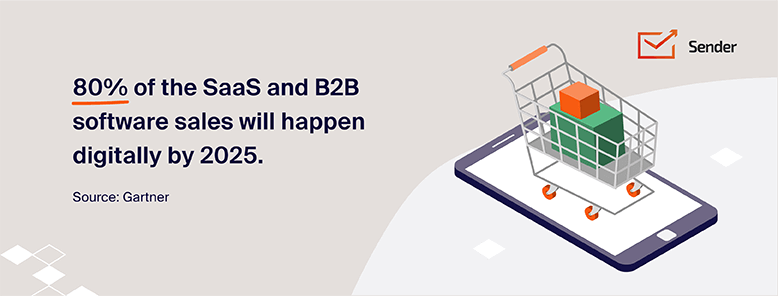
Content Marketing Effectiveness
Creating content is an important part of an inbound strategy. It helps attract website visitors, pass on the message, and engage inbound leads. Here are some content marketing statistics related to the effectiveness of inbound marketing methodology:
- Content marketing is the most effective inbound marketing strategy, with over 20% of marketers using it;
- Blogging and SEO are the top channels that offer the highest ROI in 2024;
- 79% of companies with a blog report a positive ROI from inbound marketing;
- 90% of startup founders reveal that SEO & content marketing create awareness and generate leads for their business.
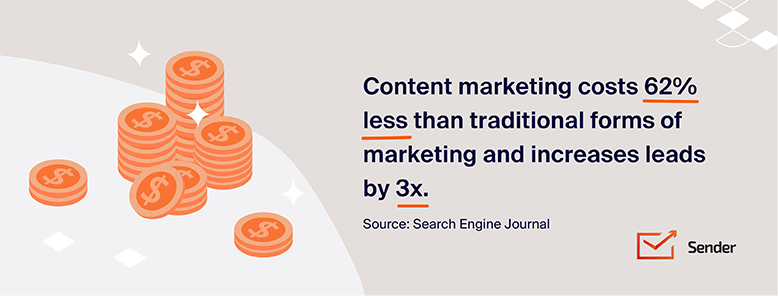
Search Engine Optimization (SEO)
If you want to attract qualified traffic to your website via search engines, posting relevant content is one of the best ideas. SEO works wonders to help you become discoverable among potential leads. Here are some relevant statistics to support the notion:
- 55% of marketers create more content and post more regularly for organic growth;
- 27% of high-performing content was a month or less old;
- Creating and posting more content and improving content are the top tactics for increasing organic traffic;
- 51% of B2C companies face challenges in measuring organic traffic;

Social Media Marketing
Social media is one of the most rewarding channels of any inbound marketing strategy in 2024. Social media and advertising accounted for 73% of the most implemented marketing tactics. Here are some more statistics related to the usage of social media for inbound marketing:
- 17% of marketers say that short-form videos on social media have generated great results;
- The top social media channels for marketers are Facebook (57%), Instagram (55%), YouTube (52%) and TikTok (44%);
- Social media analytics tools are the top choice (45%) for targeting ideal customers;
- 83% of marketers believe social media is helpful in improving brand awareness and website traffic;
- 71% of consumers with good social media brand experience are likely to recommend it to others;
- 34% of consumers say “too much self-promotion” is a major turn-off in how they perceive brands on social media.
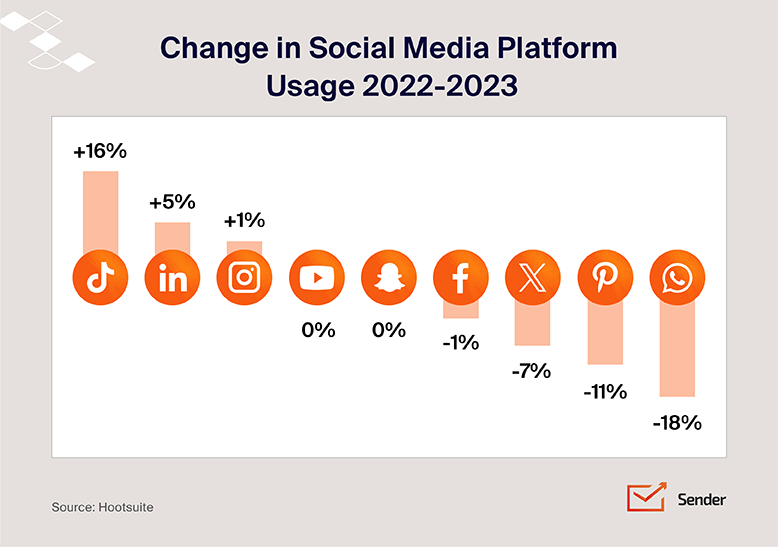
Also read: 45+ Online Advertising Statistics (Facts and Figures for 2024)
Email Marketing
Email marketing offers a high ROI, making it a preferred inbound marketing tactic of many marketers. Here are some eye-opening statistics related to inbound email marketing and its effectiveness:
- 41% of marketers admit that email is their most effective marketing channel;
- 77% of marketers have reported an increase in email engagement in the last 12 months;
- Newsletters are the most popular email type, used by 81% of marketers; welcome emails follow closely at 79%;
- Average email deliverability is at 81%, with abandoned cart emails converting three times more than other automated emails.

Using email marketing software isn’t just profitable — it’s also a breeze to pick up! Give Sender a shot.

Lead Generation and Nurturing Statistics
One of the main goals of inbound marketing services is to build an efficient lead generation and nurturing funnel. Here are some of the most important inbound marketing facts related to lead generation and nurturing:
- 76% of companies use automation for inbound marketing;
- Marketing teams using a CRM are 128% more likely to build an effective inbound marketing strategy;
- Companies that use a lead nurturing process have more sales-qualified leads at 33% less cost;
- Automating lead management increases revenue by 10% in 6-9 months;
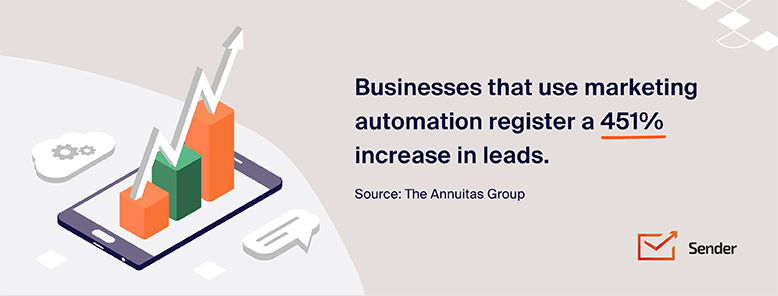
Inbound vs. Outbound Marketing Statistics
When compared to outbound marketing, inbound marketing offers a higher number of leads, improved returns, and several other benefits. Here are some important statistics that show why inbound marketing methods are better than outbound methods:
- Inbound marketing efforts can save up to 61% in costs when compared to traditional outbound methods;
- 46% of marketers say that inbound marketing gives higher ROI; Only 12% support higher outbound marketing ROI;
- Inbound marketing offers higher quality leads for sales teams compared to outbound; 59% of sales teams favor inbound vs. 16% favor outbound lead generation;
- Inbound marketing’s effectiveness in improving lead conversion rate is ten times higher than outbound marketing.
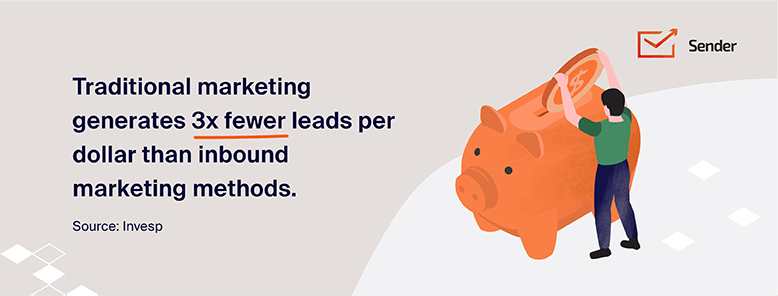
Key Takeaways
No one can deny inbound is one of the best ways to power your marketing efforts in 2024. Here are some key observations:
- Content marketing is an important aspect of any inbound marketing strategy;
- Inbound marketing ROI is higher than other forms of marketing;
- Inbound leads are more inclined to buy from a brand or service;
- Consistent inbound marketing activities offer long-term advantages and organic visibility.
If you’re craving for more knowledge, here’s more valuable articles that might catch your interest:
- Inbound vs Outbound Sales: Meaning, Strategies
- Abandoned Carts: Statistics, Reasons & Recovery Strategies
- 7 Best Customer Engagement Platforms (Free & Paid)
*Sources:
- https://www.invespcro.com/blog/how-effective-is-inbound-marketing/
- https://www.lucatagliaferro.com/post/b2b-marketing-statistics/
- https://www.conveyormg.com/blog/12-inbound-marketing-statistics-that-should-matter-to-b2b-marketers
- https://business.linkedin.com/sales-solutions/social-selling
- https://userguiding.com/blog/inbound-marketing-statistics-trends/
- https://hikeseo.co/why-seo-is-important-for-startups-and-why-were-building-hike/
- https://www.semrush.com/blog/content-marketing-statistics/
- https://www.gartner.com/en/digital-markets/insights/improve-marketing-funnel-experience-for-customers
- https://aicontentfy.com/en/blog/key-inbound-marketing-statistics-you-need-to-know-for-success
- https://www.hootsuite.com/research/social-trends
- https://blog.hubspot.com/blog/tabid/6307/bid/28943/25-Jaw-Dropping-Marketing-Automation-Stats-Data.aspx
- https://blog.hubspot.com/marketing/hubspot-blog-marketing-industry-trends-report
Author bio
Anmol Ratan Sachdeva is a content marketer and small business consultant who has a strong grip on topics like marketing automation, email marketing, and content marketing. He loves to write about building, improving, and growing a business.

